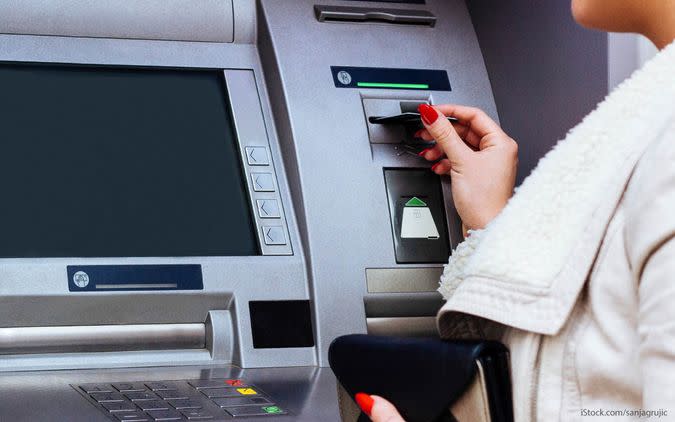17 Biggest Budgeting Mistakes You’re Making

Budgeting isn't just about depriving yourself of things you want. On the contrary, a good budget accounts for incidentals while allowing you to pay your bills and put money away for the future.
Find Out: How To Set a Realistic Budget You Can Live With
Learn: How To Get Into the Habit of Saving Money
Unfortunately, false perceptions about budgeting cause many people to make mistakes or give up on the idea of a spending plan altogether. Here are some of the biggest budgeting errors to avoid, plus tips to help you put more money in the bank each month.
Last updated: July 26, 2021

1. Estimating How Much You Spend
Before you can create a budget, you have to know where your money goes and what your true cost-of-living expenses are. Estimating or guessing your expenses isn’t going to work, because you’re likely spending more than you think each month.
“It’s a good idea to track your spending for a month or two before you try to come up with a budget,” said Barry Choi, personal finance expert at Money We Have. “Make a log of everything you spend money on. This way, you can see where your money is going and then come up with a realistic budget.”
Day 6 of Living Richer: Where To Put Your Money: Savings or Retirement?

2. Forgetting To Save For the Unexpected
A budget isn’t only useful for managing bills — it’s also a tool to help grow your personal savings. As you create a budget for fixed and variable expenses, don’t forget to pay yourself. Treat your savings account like any other expense in your budget, and you’ll slowly grow a rainy day fund.
Day 4 of Living Richer: How To Live Richer on a Budget

3. Having Unrealistic Expectations
You might be eager to improve your financial situation, but you shouldn’t set your standards too high. Extreme budgeting looks good on paper, but this approach isn’t always effective or realistic.
“Novice budgeters, especially those trying to pay off credit card debt, often get the numbers to add up on paper, but they have no basis in reality,” said Stephanie Genkin, a financial planner in Brooklyn, New York. “I look at these budgets and ask these folks, ‘Are you really going to stop eating lunch out every day when previously you were always eating out?’”
Instead, Genkin suggested starting small with baby steps, perhaps packing your lunch twice a week and gradually adding an extra day until you’re no longer eating out five days a week.

4. Budgeting Based on Your Gross Income
You might earn $40,000 a year, but after taxes, health insurance and other payroll deductions, your actual earnings are much less. For a realistic budget, you’ll need to create a spending plan based on your net or take-home pay.

5. Not Considering Cheaper Alternatives
Lowering expenses is one way to keep costs within budget, but you might feel like there’s little you can do about the cost of certain things, like utilities. However, utility rates aren’t set in stone, and you have more options than you realize.
Money-saving expert Andrea Woroch recommended reviewing monthly utility bills and looking for ways to save, such as searching for new providers and comparing rates, or speaking with a retention specialist to see if you’re eligible for a discount or special promotion. The company might lower your rate to retain your business.

6. Owning Too Many Financial Accounts
If you have too many credit cards and multiple checking accounts, it’s easy to lose track of how you’re spending your cash. Woroch suggested simplifying and streamlining all your accounts.
“With so many store cards and credit cards, you won’t be able to track spending nor stay on top of payments, which can lead to costly disasters -- including credit score damage, late fees, revolving balances and overspending,” she said.

7. Buying Too Much House
Most people wouldn’t dare walk away from their dream home, but buying too much house is a budget buster. If you’re creating a budget and discover that your mortgage or rent payment is the underlying cause of financial anxiety, it might be time to downsize into something cheaper.

8. Spreading Yourself Too Thin
If you're creating a budget, it's only logical to include expenses like paying off debt, building an emergency fund, saving for a vacation and helping a relative financially. But your cash only goes so far. Saving for multiple goals simultaneously or taking on too many responsibilities might be unrealistic and unnecessarily strain your budget.
Digitize: 5 Budgeting Apps That Can Help You Live Richer

9. Never Adjusting Your Variable Expenses
Budgeting doesn’t work unless you’re willing to change your spending pattern if needed. If an assessment of your expenditures reveals you’re spending too much on categories like entertainment, shopping and recreation, you’ll need to make adjustments or else you’ll continue to overspend each month.

10. Stealing Money From Other Savings Funds
As tempting as it might be, don’t dip into or steal cash from other spending categories. For example, if you’ve already spent your recreation or shopping budget for the month, don’t take money from your grocery or transportation fund just because there’s a sale at the mall.

11. Never Updating Your Budget
Your income and expenses can change from year to year. Therefore, the budget you create today might be irrelevant by this time next year.
“Costs change all the time, so avoid any cash flow problems by updating your budget on a regular basis,” Choi said. “Don’t forget to add any increases to your income.”
Day 1 of Living Richer: The Top 3 Budgeting Tips From Experts

12. Choosing the Wrong Budgeting Software
Between computer software programs, apps and websites, there’s no shortage of helpful budgeting tools. Just know that a budget tracking system that works for one person might not work for you. You have to compare available options and choose the best budgeting app or program that you’re comfortable using.
“About three-quarters of the clients I see actually hate Mint,” Capalad said. “But often it’s the one they’ve heard of, so they try it and then forget about it. It’s all about experimenting with and finding a tracking system you can see yourself using day to day.”

13. Trying To Keep Up With Friends
The reality is your peers might not share your financial mindset or be as budget-conscious as you, which can stall your progress.
“In an effort to keep up with your spendy friends, you may be blowing more money than you should,” said Avery Breyer, best-selling author of “Smart Money Blueprint: How to Stop Living Paycheck to Paycheck.”
This doesn’t mean cutting these people completely out of your life -- just be conscious of whom you shop with.

14. Dictating the Family Budget
In the case of couples, one person shouldn’t dictate or control the family budget or household funds. A budget is only effective when both parties communicate and agree on the terms, so take time to talk it out before putting pen to paper.

15. Forgetting About Irregular Expenses
It’s good that you’re budgeting for unexpected expenses like gifts, car repairs and home improvements, but you’ll also need to budget for irregular expenses, such as annual insurance payments and tax bills.
“I try building those expenses into my budget by estimating the annual cost, then dividing by 12,” said Stefanie O’Connell, millennial finance expert and founder of The Broke and Beautiful Life.

16. Depriving Yourself of Fun Money
Getting serious about your money and spending less doesn’t have to mean sitting at home bored. Everyone needs to blow off steam from time to time, and having a little fun with your money isn’t irresponsible.
“No budget on Earth will work long term if you don’t allow for some fun stuff, even if it’s as small as a chocolate bar once a week,” Breyer said.
See: 37 Life Hacks That Will Save You Money

17. Thinking You Don’t Need a Budget
If you never take the time to sit down and write out a weekly or monthly budget, don’t expect your personal finances to improve. Fixing your financial outlook takes effort and work. It isn’t enough to say you want to change; you have to take the first step.
More From GOBankingRates
This article originally appeared on GOBankingRates.com: 17 Biggest Budgeting Mistakes You’re Making
